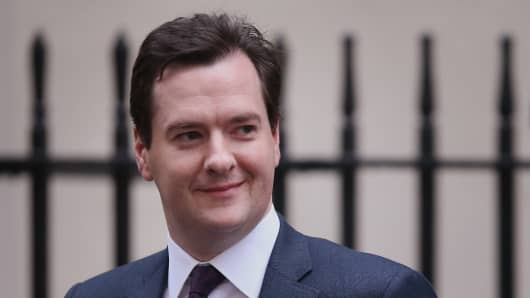U.K. Chancellor George Osborne said on Monday that banks in Britain will be forced to separate retail banking from riskier investment banking activities.
"No more rewards for failure… no more taxpayers forking out for the mistakes of others," he said, speaking at a branch of JPMorgan Chase based in Bournemouth, a seaside resort on England's south coast.
"I can announce that your high street bank will have different bosses from its investment bank.Your high street bank will manage its own risks, but not the risks of the investment bank. And the investment bank won't be able to use your savings to fund their inherently risky investments," he said.
Michael Browne, fund manager at Martin Currie, said the aim of the changes was to ensure that both the retail and investment arms of Britain's banks are sufficiently capitalized.
"It is an incredibly narrow bridge to be walking over and what Osborne is trying to do is satisfy the political aims, while not completely messing over the banks," Browne told CNBC.
Britain is in the midst of a substantial shake-up of its banking regulation, in the wake of public controversy over the 65 billion pounds ($102 billion) of public money used to shore up the Royal Bank of Scotland and Lloyds Banking Group.
"When RBS failed, my predecessor Alistair Darling felt he had no option but to bail the entire thing out. Not just the RBS on Britain's high streets, but the trading positions in Asia, the mortgage books in sub-prime America, the property punts in Dubai. I want to make sure that the next time a Chancellor faces that decision they have a choice, to keep the bank branches going, the cash machines operating, while letting the investment arm fail," said Osborne.
(Read More: Barclays Forced to Name Executives on Libor List)
New Barclays Chief Executive Antony Jenkins opted not to take a bonus for 2012 after the bank was charged
$450 million
for its part in the global interest rate rigging scandal.
Osborne said: "From 2005, traders, brokers and bank officials attempted manipulation of one of the most important reference rates in our economy – a rate which affects the mortgage payments and loan rates of millions of families and hundreds of thousands of firms, large and small."
Britain's Financial Services Authority, the body charged with regulating the country's banking sector, will be abolished in April, and its powers returned to the Bank of England, said Osborne.
He said that in the build-up to the crisis, the FSA "did not see the wood for the crisis".
"The fire alarm was ringing when Northern Rock handed out 150 percent mortgages… but no one was listening… when the crisis hit, the fire was so great that the whole economy was sacrificed to put it out."
Osborne said that under the new regime, the Bank of England will be a "supercop" with the power to "call time if the party gets out of control".
He added that a new body will be established in April called the FCA (Financial Conduct Authority), which will be charged with regulating market conduct.



